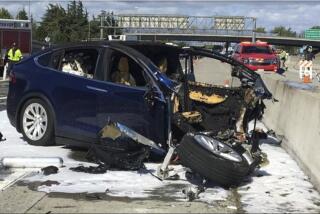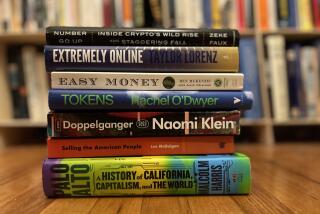Has the e-book bubble burst?
- Share via
I like Nicholas Carr. His 2008 Atlantic cover story “Is Google Making Us Stupid?” (expanded two years later into “The Shallows,” a 2010 Pulitzer finalist) helped catalyze a key idea: the distracting nature of digital culture, which encourages us to read widely but not necessarily deeply, flitting from concept to concept, piece to piece, like mosquitoes on a pond.
For Carr, this is both a social and a biological problem; among the most interesting parts of “The Shallows” are those dealing with the brain. Computers, Carr argues — or, more to the point, our use of them — are literally rewiring our brain chemistry, causing us to think differently than we did in an analog world.
Given all that, it’s perhaps not surprising that Carr should emerge last week with a Wall Street Journal piece arguing the e-book bubble may have burst.
“Half a decade into the e-book revolution …,” he writes, “the prognosis for traditional books is suddenly looking brighter. Hardcover books are displaying surprising resiliency. The growth in e-book sales is slowing markedly. And purchases of e-readers are actually shrinking, as consumers opt instead for multipurpose tablets. It may be that e-books, rather than replacing printed books, will ultimately serve a role more like that of audio books—a complement to traditional reading, not a substitute.”
Carr may miss the point when it comes to e-readers — of course, sales have declined since the advent of the tablet, which is a far more versatile (and, in its way, revolutionary) machine — but his other arguments are harder to dismiss.
“From the start,” he observes, “e-book purchases have skewed disproportionately toward fiction, with novels representing close to two-thirds of sales. Digital best-seller lists are dominated in particular by genre novels, like thrillers and romances. Screen reading seems particularly well-suited to the kind of light entertainments that have traditionally been sold in supermarkets and airports as mass-market paperbacks.”
What he means is that e-books have filled a niche in the publishing landscape, rather than eating it alive. This echoes my own (admittedly anecdotal) experience, which is that I download what we might call secondary titles — in other words, books I don’t necessarily intend to keep.
I’m reminded of my honeymoon, nearly 25 years ago, when in the interest of keeping it light, my wife and I traveled with cheap paperbacks, which we left behind when we were done. This has always been the role of mass-market publishing, and it’s one e-books seem particularly suited to fulfill.
Carr cites various statistics in support of his argument, such as the 2012 finding, by a Bowker Market Research survey, “that just 16% of Americans have actually purchased an e-book and that a whopping 59% say they have ‘no interest’ in buying one.” This is less compelling to me, since these numbers may be age-related; I live with teenagers who do much of their reading on electronic devices, whether laptop or tablet or phone.
But here’s the thing about my kids: They’re platform agnostic, and read on the page as well. It only supports Carr’s conclusion that e-books “may turn out to be just another format—an even lighter-weight, more disposable paperback.”
ALSO:
David Malouf’s pursuit of happiness
Lebowski lovers: The Dude and the Zen Master riff in L.A.
Winter book preview: What titles are booksellers anticipating in 2013?
More to Read
Sign up for our Book Club newsletter
Get the latest news, events and more from the Los Angeles Times Book Club, and help us get L.A. reading and talking.
You may occasionally receive promotional content from the Los Angeles Times.











